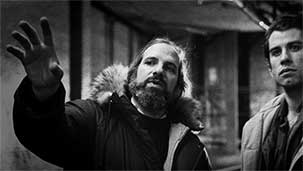Dear Tim McEown,
This is a thing I’ve long wondered about criticism in general and film criticism in particular: how can one disassociate the experience of art with the object of art itself?
No one reads a book or listens to music or watches a film in a total vacuum of objective critical focus. These are entertainments, and the whole notion of entertainment is to distract or edify or otherwise conjure good feelings inside one’s brain and/or heart. A book that you read on a beach in Mexico during a much-needed vacation from the crushing responsibilities of your professional life is experienced in a very different way than the book you read in fifteen-minute iterations over the course of a month on the bus that carries you each day to and from the crushing responsibilities of that professional life. A song that you first hear faintly playing in the background at a friend’s barbecue certainly affects you in a different way than the song that was playing at your junior high mixer when you looked across the gymnasium and saw Jessica Harbicht slow-dancing with Eric Forbes and his hands were in her back pockets!
And films. Films are the worst. Particularly when you see them in theaters. Because orbiting around the theater experience are numerous considerations: arrangements to be made (with friends, Tinder dates, babysitters); snacks (salty, sweet, unhealthy, extremely unhealthy); and, worst/best of all, other people sitting around you, each having their own unique moviegoing experience.
We like to think, as aficionados, that our arcane knowledge trumps our subjectivity—that somehow our understanding of, say, Auteur Theory or Apparatus Theory, or our devotion to Pauline Kael or Andrew Sarris, colours our ability to rationally judge an experience more than, say, whether you were able to time your arrival at the front of the concession to coincide with a freshly-popped batch of popcorn, or whether you got stuck with one of those limp three-quarters-full bags that has been sitting under a heat lamp for twenty minutes and turns out to be, once you dig to deeper strata, mostly composed of broken, burnt bits scraped from the bottom of the machine hours earlier. I can’t understand how a person can honestly say that the middle act of Interstellar is too self-serious and meandering when there’s a chance they might have been eating a bag of popcorn like that.
So what can I tell you, Tim, of my experience watching Noah Baumbach and Jake Paltrow’s documentary, De Palma, that isn’t deeply influenced by the physical conditions of my immediate environment and precise circumstances of my life in that particular moment of time?
I arrived at the VanCity Theater in Vancouver in a state of existential unease. The kind that is unique to business travel, wherein one is simultaneously relieved to be away from the routine of the 9-to-5 workday – the small talk with colleagues, the big talk with bosses – and also perturbed by the uncertainties of the foreign workday that awaits: the new people to make small talk with, the big talk one must inevitably engage in to justify the cost of cross-continent plane fare and deluxe accommodation. Not to mention the part where one misses one’s family and resents being taken away from them, yet simultaneously feels guiltily glad to be away from them and have a bit of freedom to, say, eat an entire pizza for dinner and then go to a movie alone.
The VanCity Theater is an exceptional little place. It’s not one of those old repertory cinemas with an ornate marquee, columns and lintels, velvet curtains and vintage, musty odors. They do have a little exterior ticket window, and the interior is laid out like the lobby of a hip hotel, all plain white walls, tall windows, café tables and couches. I arrived early enough to buy a beer and a package of licorice and lounge around for a while. The others waiting in the lobby with me were so typical of the demographic you might imagine to be loitering in the lobby of a nifty modern theater in Vancouver that it seems somehow cruel to describe them in further detail other than to say they were wealthy and middle-aged and predominantly white.
When the doors eventually opened, we poured in and selected our seats a respectful distance from one another, passing the last few minutes before showtime watching the screen upon which an upcoming retrospective on mid-century Cuban cinema was being promoted. The place smelled like a classroom. The seats were soft and deep and ergonomically supportive. My cold beer sat sweating in the cupholder, waiting. This, the beginning of things.
I was overcome with such a sense of peace and excitement in that moment of prologue that I felt it physically; like there was a nozzle in my chest and someone had attached a hose and released into my body a hissing blast of ice-cold helium. The iris closed and blacked out the whole complicated fractal spread of my life – the myriad responsibilities both professional and personal and the myriad fears and anxieties attached to each of them – and I was there, in the theater, present in the cosmic moment in that Zen Buddhist way that self-help books about mindfulness try (and fail) to teach you how to conjure at will.
So, Tim, here’s the essential question I want to ask you:
Was De Palma a sublime moviegoing experience because it was a terrifically constructed and materially fascinating film which in its deceptive simplicity – basically just a single-take of a charismatic guy sitting in a chair in what appears to be his dining room, chatting unreservedly about his long and controversial career – is able to convey an artistic complexity and ambition of vision that on the surface of Brian De Palma’s actual films is difficult to identify (and maybe, in some cases, completely invisible)?
Or was the sublimity I experienced an effect of my mood, and of my physiological reaction to the hoppy IPA and perfectly supple licorice whips and the library-like quiet of the lobby and my desperate need, that particular evening, to remove myself from the world?
What we often pretend at, in criticism, is that we are not people, but rather these free-floating consciousnesses—bodiless intellectual machines that can process the pure data of a Thing and output an absolute empirical answer about whether or not that Thing sucks or is awesome or is just kinda okay. But movies – even analytical documentaries like this – are not expressions of pure intellectual substance. And people – even knowledgeable, tasteful people like me (self-proclaimed) – have memories and desires and are subject to unknowable subconscious prejudices.
The answer to the question I’ve asked above (which I’ll admit I don’t know) probably goes a long way to explaining my own curious reaction to superhero movies, as well as the dissonance many critics feel between their immediate instinctive response to a film and the broadening (or shrinking) of perspective they experience after the passing of a few days or weeks or even years (after that time has passed, they must reconcile their memories of that film with their experience of seeing it, which has been amplified or shrunken by their autobiographical memory).
When the end of the year arrives and we start compiling our lists of the best films of the year, De Palma will be at the top of mine. Perhaps by then I may have a sense that it wasn’t objectively the best motion picture released in the last 12 months. But our favorite things are never objective. They belong to us. We possess them, and we do so because they are meaningful beyond the simple diegetic expression of what we have seen onscreen and heard on the soundtrack. Our favorite movies mean something—not just because they are good, but because, in some way, they made our lives good, too.
For those two hours in Vancouver, at a time when I desperately needed it, De Palma made my life better. Which, on its own, is no criteria by which anyone should decide to rush out and see it. But is reason enough for me to judge it, empirically, unfairly, but totally accurately, a five-star film.
For whatever that’s worth.
Sincerely,

Jared






